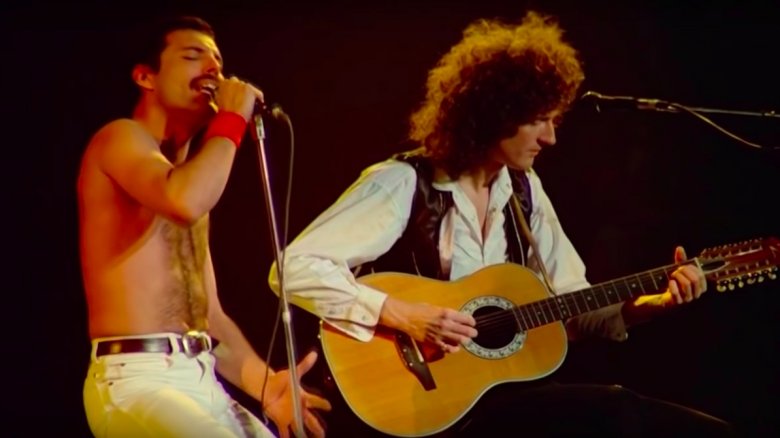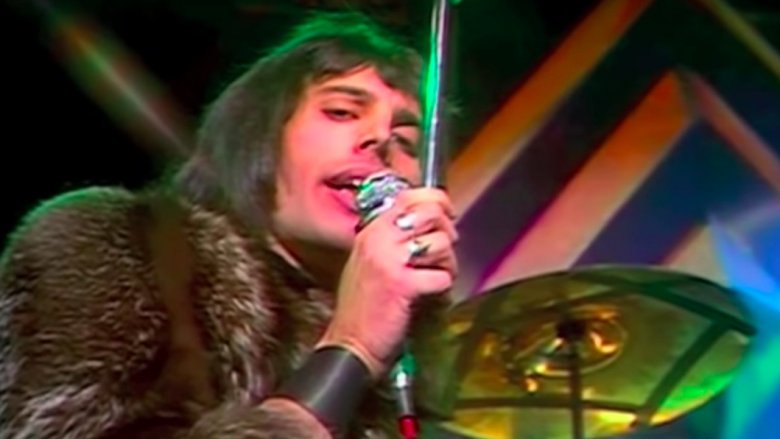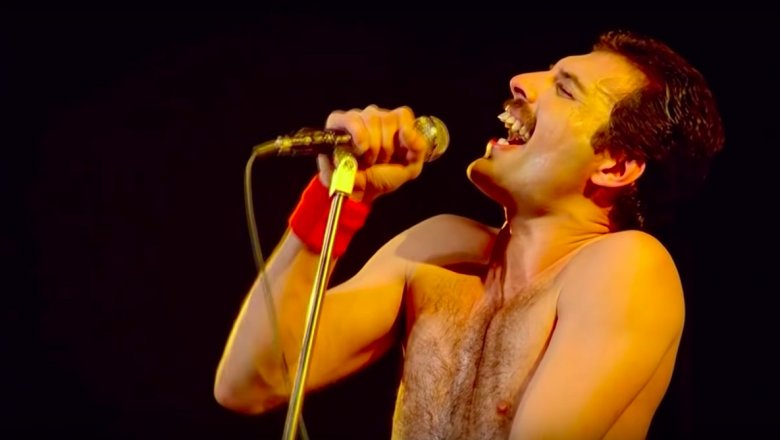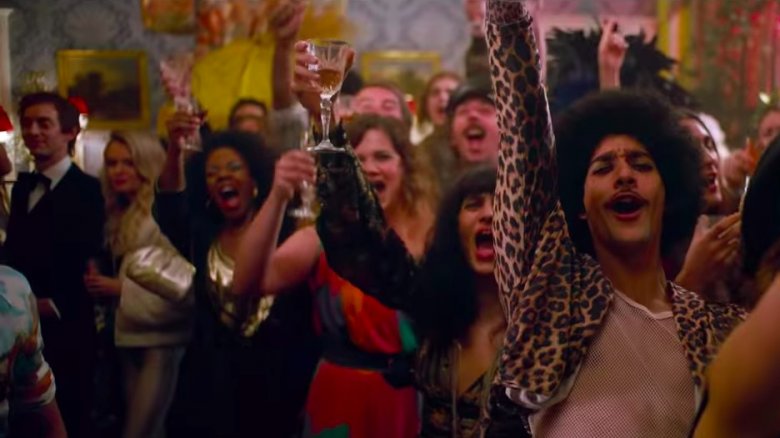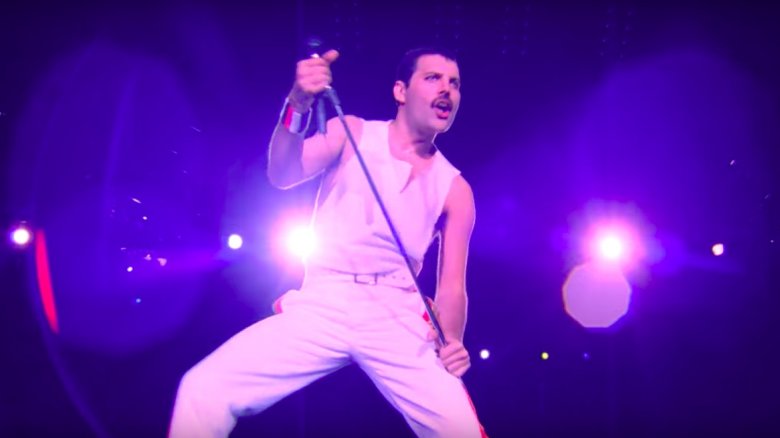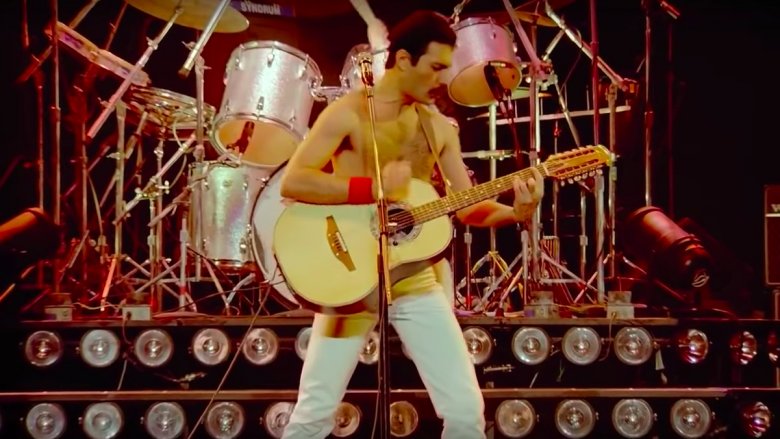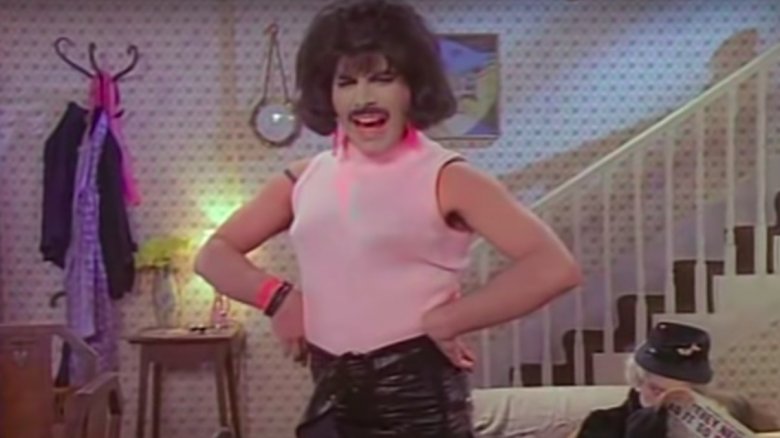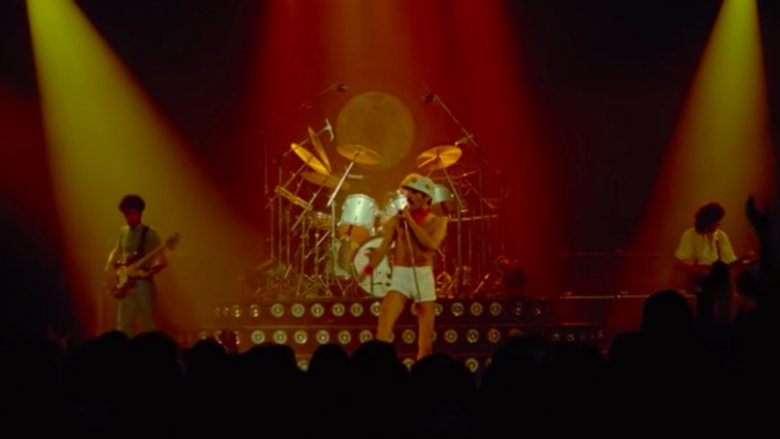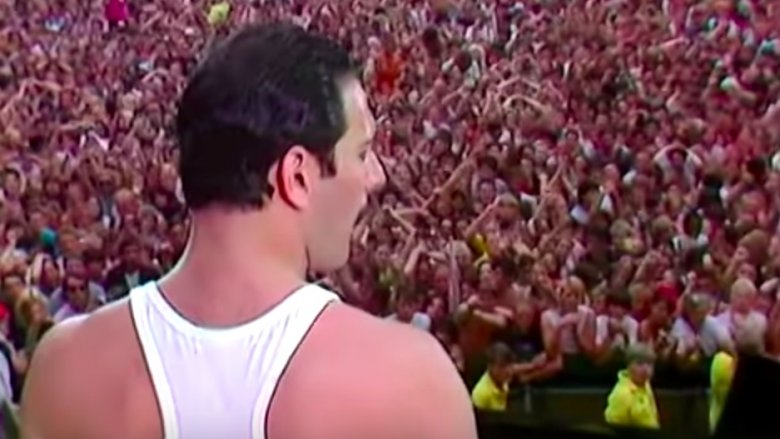False Facts About Queen You Always Thought Were True
They're called "rock legends" for a reason. A legend is larger than life, it transcends time, it inspires not just one generation but many generations, and a lot of the details are bollocks. Queen, as we all know, is like the biggest rock legend of all the rock legends, so it won't surprise you to hear that some of the stuff you've been told about them isn't actually true. In fact what's surprising is that a lot more of the stuff you've been told about them isn't actually true — fortunately for Queen, most of the original band still lives and is capable of shutting down the worst of the rumors.
The Bohemian Rhapsody movie did invent a few of its own false facts, so definitely don't go there if you're looking for a super-accurate retelling. And when you find what sounds like the truth about Queen, well, maybe cross-check it here before you decide whether you should believe it.
Freddie Mercury was in the closet
It is true that Freddie Mercury was an intensely private person. He told very few people about his AIDS diagnosis, for example, and he didn't publicly say anything about his illness until the day before he died.
But he wasn't exactly closeted, either. He didn't go to gay bars in disguise — he went openly and was often seen in public wearing a T-shirt from the London gay club Heaven. And he didn't exactly lie or deny when asked about his sexuality in interviews, either. According to journalist Tim Teeman, he told New Musical Express as early as 1974 that he was as "gay as a daffodil," though that's not really the same thing as saying "I'm gay" since daffodils, if they are actually gay, are still in the closet. Then in a 1985 interview he said, "All my lovers asked me why they couldn't replace [my ex-fiance] Mary, but it's simply impossible. I couldn't fall in love with a man the same way I did with Mary." Which again, isn't exactly saying "I'm gay" but is definitely revealing a few things. He even commented at one point that openly revealing his sexuality might be seen as a publicity stunt.
So Mercury wasn't hiding anything — it's just that we see it that way because his sexuality wasn't something talked openly about. Jim Hutton, who had a seven-year relationship with Mercury, summed it up like this: "We both thought our relationship, and being gay, was our business."
The secret to his success was ... his buck teeth?
When Freddie Mercury was a kid his classmates called him "Bucky." Now everyone who has ever been picked on by their peers knows two things: Kids are especially cruel little creeps, and the taunting you experience during childhood can follow you to your grave. And so began Mercury's love-hate relationship with his own teeth.
According to Ultimate Classic Rock, Mercury had four extra teeth on the top of his mouth, which is what caused the extreme overbite he's famous for. He was so self-conscious about his overbite that he would often cover his mouth when speaking, and he almost never smiled with his mouth open, at least not for photographs. And yet he never had them fixed, either, which he could have done easily once he became a wealthy rock star. Why? Because he thought his teeth were the secret to his astonishing singing voice.
Most experts believe, though, that Mercury had it wrong. A person's teeth don't really have much to do with his or her singing voice. Mercury did, however, have other qualities that are unusual in a singer — according to Scroll.in, he was likely a baritone but he sang as a tenor. And he was able to access his "false vocal cords," which most people don't use for speech or singing. That's what gave his voice that famous Freddie Mercury growl.
I don't really want to ride my bicycle all that much
"Bicycle Race" was maybe not the most awesome Queen song. Well, depending on who you ask. But seriously, "I want to ride my bicycle / I want to ride my bike / I want to ride my bicycle..." Were you just not feeling really inspired that day, Freddie?
Anyway, you might be forgiven for thinking the song must be autobiographical because of all the enthusiasm, but in 2011 Brian May corrected the misconception in an email to a fan: "Just because a song is written in the first person doesn't mean it's in any way autobiographical. As I remember, Freddie ... wasn't very keen on riding his bicycle (if he even had one!) — he preferred being driven in a Rolls Royce! But he created a character in the song, and this character can say what he wants, and he can ride his bicycle where he likes!"
Incidentally, May also corrected the misconception that the line "and I don't like Star Wars" was autobiographical. "Freddie liked Star Wars a lot," he said. For proof of that one, here you go: During the late '70s and early '80s, Mercury would often return to the stage for his encore while perched on Darth Vader's shoulders.
Some seriously messed-up things happened at that one party
One of the most infamous Queen legends involves a wild party, some snake charmers, fire-eaters, strippers, and some serious exploitation of one specific minority group. This particular party actually did happen — it was held at the Fairmont Hotel in New Orleans to celebrate the release of Queen's album, Jazz, in 1978. "We just wanted to have a bit of fun," Freddie Mercury later explained, which is seriously like the most understated thing any human being has said, ever.
The party really was pretty wild. Most reports confirm the presence of strippers and snakes and other questionable acts, and evidently Mercury actually did sign someone's naked butt. But the most infamous of all those infamous reports is the one about the dwarfs, who were apparently hired to walk around the place with cocaine-laden trays strapped to their heads. That, at least, is not true. "The story is apocryphal," record-label executive Bob Mercer said in an Entertainment Weekly article. "As far as I know, I was the only one there that had any blow."
Freddie Mercury's huge ego
It's sometimes hard for us normal humans to imagine that the person we see on stage isn't the same person off-stage, but in Freddie Mercury's case there was a definite line between performer and performance. Freddie Mercury was a showman — he knew exactly how to work a crowd and he was just as famous for his strut as he was for his singing voice, so a lot of fans believed the larger-than-life person they saw on stage must have had an outsized ego to match his outsized persona. But most of the people who knew Freddie Mercury say his ego vanished when he was off-stage.
Former Queen roadie Peter Hince told Louder that the arrogance and the strut were just part of the act. "People talk about Freddie and his ego, but his ego was not as big as people think. It was all persona. He could make fun of himself. ... He wasn't necessarily the prima donna that everybody thought he was."
Mercury was devoted to his family, too. His mother, Jer Bulsara, told Tim Teeman that even after her son was swept up by fame he would still make time for them, and when he was in England he would make an effort to visit once a week. That doesn't sound too much like a guy who is driven only by his ego.
Freddie Mercury pretended not to be Indian
This one is sort of a trick question because not only did Freddie Mercury not really deliberately hide his heritage, he also wasn't Indian, though there are still many people who think he was.
According to the Los Angeles Times, Freddie Mercury's parents lived in India before moving to Zanzibar, where he was born, and Mercury also attended a boarding school in India at the age of 8. "But Freddie wasn't Indian," his brother-in-law Roger Cooke told Tim Teeman. "He was Parsee." The Parsees are ethnic Persians who settled in India.
Mercury never really spoke publicly about his heritage, just as he rarely spoke publicly about his sexuality, but that doesn't mean he was trying to hide it. "Freddie was a Parsee and he was proud of that, but he wasn't particularly religious," his mother told the Telegraph in 2011.
It's not surprising that Mercury wasn't religious — devout Parsees view homosexuality as "a type of demon worship," so it's not like his religion was unconditionally loving and supportive or anything. Still, not being "especially religious" isn't the same thing as denying your heritage, so reports that he was hostile toward his own background are unfounded. By all accounts, Mercury had a positive relationship with his family. Compare that to Jim Morrison, who once said his parents were dead (even though they were very much alive), and it's pretty clear that Mercury's connection to his roots was unusually healthy, for a rock star anyway.
Freddie Mercury stank at guitar
If you think it's hard to strut and play guitar at the same time, try doing the microphone stand thing Freddie Mercury was famous for while simultaneously picking out a melody on your Fender. Awkward. Maybe that's why Freddie Mercury rarely played guitar on stage, but it certainly wasn't because he didn't know how to.
We usually imagine that guitarless front men are guitarless for a reason — because they haven't got the talent for it. And Mercury seemed to enjoy perpetuating that particular myth, too. In 1981 Rolling Stone says he told Melody Maker that he wrote "Crazy Little Thing Called Love" on the guitar, "which I can't play for nuts," and then went on to say that it was his limited knowledge of guitar chords that allowed him to write such a good song. "It's a good discipline because I simply had to write within a small framework," he said.
He was probably just being modest, though. It's clear that he could actually play for nuts because he often played guitar on stage when Queen performed "Crazy Little Thing Called Love" and seemed more than comfortable doing it. Although, next to Brian May it's maybe a little easier to see why that myth was perpetuated ... Mercury could play guitar well enough, but there's a reason it was usually May's job.
I Want to Break Free was a coming-out song
Queen's "I Want to Break Free" video scandalously featured the entire band dressed in drag, with Freddie Mercury himself manning a vacuum cleaner and showing off his lovely black bob. It's worth mentioning up front that Monty Python did this sort of thing for years prior to Queen doing it, and yet when it was released in 1984 Americans did a lot of gasping and pearl-clutching because of all the horror. You will often hear people say that the video was banned in the U.S., though Open Culture says there really isn't any historical evidence of a ban. Anyway the whole thing was intended to be a parody of a popular British soap opera called Coronation Street, so of course Americans didn't get it. Instead, they thought it had something to do with Freddie Mercury being gay, and from there concluded that it was Freddie Mercury's coming-out song.
Now the title taken out of context could certainly mean something like "breaking free" from the closet, but the truth is that the song had really nothing to do with Mercury apart from the fact that he was the one singing it. It was actually bassist John Deacon who wrote "I Want to Break Free," and he meant the song not as a coming-out ballad but as a comment on women's rights. And also, the drag was supposed to be funny, people. Americans are way too serious.
Subliminal messages
Back in the '80s there was this weird cult of playing music backward to see if you could hear something sinister, and then when you thought you did, excitedly declaring to have found evidence of a band's debauchery and trying to use that as proof that said musician or musicians ought to be banned because "the children." Yes, people actually spent their time doing this instead of volunteering at a soup kitchen or something because the moral majority must prioritize.
Queen was not immune to this sort of scrutiny, which is weird because it seems like the cult-of-backward-record-listening really didn't need to look much farther than that one party at the Fairmont in New Orleans for evidence of debauchery. Anyway, they found it and you might want to sit down with a paper fan or something so you don't pass out from the scandalous horror. Played backward, "Another One Bites the Dust" (supposedly) says "It's fun to smoke marijuana." Gasp.
So it's not exactly "Murder is cool" or "Satan rocks" but still, it's not really okay to tell your potentially younger audience to use illicit drugs. But does it really say that? According to the Salt Lake Tribune, no. Most "backmasking," as it's known, is just the power of suggestion. In a recent experiment, subjects who listened to "Another One Bites the Dust" backward weren't able to pick out the so-called subliminal message until the researchers told them what they were supposed to be looking for. Busted.
Live Aid saved Queen
Queen rocked Live Aid, and their performance is widely recognized as one of the greatest live performances of all time. Somehow, this seems to have led to a myth that Queen was done for until they showed up at Live Aid and reminded everyone how awesome they were.
That's all wrong, though. It is true that Queen faced a bit of a decline in the early '80s — according to Classic Rock Review, their 1982 album Hot Space was an abysmal failure, mostly because it was "quasi-disco" in an era where pretty much everyone thought disco sucked. So after Hot Space, the band decided to go off and do their own projects for a bit, but by 1984 they were back again with The Works. That's the album that featured "I Want to Break Free" and its companion Queen-wears-drag video, which may have helped fuel their diminishing popularity in the United States but definitely did nothing to damage album sales in the United Kingdom. So there was a perception, at least in America, that Queen was on the decline.
In fact, The Works reached #2 on the U.K. album charts and spent 93 weeks there, so Queen were hardly has-beens when they arrived at Live Aid in 1985. Their legendary Live Aid performance may have helped bolster them in the U.S., but it's not as if they really needed it.
